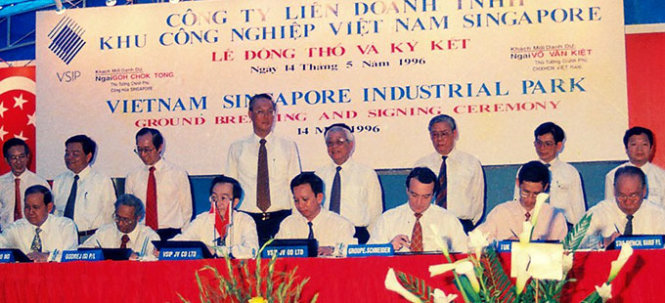The remaining nine countries of the Association of Southeast Asian Nations (ASEAN) have invested over US$56 billion in Vietnam, making up 21 percent of the total foreign direct investment (FDI) channeled into the nation, in the last 30 years, according to the Foreign Investment Agency (FIA).
The inflow of ASEAN FDI to Vietnam has marked the regional economic integration of both the bloc and the country, which is only realized after a period of their capital, capacity and experience accumulation, the agency under the Ministry of Planning and Investment said.
Some ASEAN firms, in the form of joint ventures and 100 percent foreign-owned entities, began investing in Vietnam in the 1990s, when the country started receiving FDI, but the inflow was halted in 1997 in the wake of Asia’s financial crisis, the FIA added.
The next stage of FDI from ASEAN started from the early 2000s, when Vietnam reached many important trade agreements, especially with the U.S. in 2001, and its entry into the World Trade Organization in 2007.
From 2011 to now, Vietnam has changed its policy to draw more FDI, leading to more investment flowing from ASEAN, most of which came from Singapore, Malaysia and Thailand.
With over $33 billion in FDI, Singapore is currently the largest ASEAN investor in Vietnam, and the third globally, after South Korea and Japan.
Singaporean FDI has been focused mainly on industrial parks, construction and realty, typically the establishment of Vietnam-Singapore Industrial Parks and many other real estate and tourism projects across the country, the FIA said.
Malaysia has the second-largest ASEAN FDI in Vietnam, with its capital poured in through joint ventures or foreign-owned companies operating in infrastructure, real estate, education and petroleum.
Thailand, ranking third when it comes to ASEAN capital in Vietnam, channeled funds into the country by buying large or major stakes in Vietnamese firms, like Thai conglomerate SCG’s purchase of shares in Binh Minh Plastics, Tien Phong Plastics and Prime Group.
Besides, Thai firms also pay attention to the Vietnamese retail sector, evidenced by the acquisition of many big retailers in the market, including the Family Mart supermarket chain, the Metro supermarket chain and electronics retailer Nguyen Kim, according to the FIA.
The establishment of the ASEAN Economic Community will also help boost ASEAN FDI in Vietnam.
Overall, the AEC would be the 7th-largest economy in the world, with about $2.4 trillion in GDP, 25 percent higher than India's gross domestic product.
In the coming time, Vietnam will possibly benefit from the Trans-Pacific Partnership (TPP) free trade agreement, the FIA said.
The TPP deal, which aims to liberalize commerce in 40 percent of the world's economy, was reached following five years of negotiations between 12 countries, including Australia, Brunei, Canada, Chile, Japan, Malaysia, Mexico, New Zealand, Peru, Singapore, the U.S. and Vietnam, in a final talk in Atlanta on October 5.
The party countries are expected to officially sign the deal no later than the end of the first quarter of next year, after which their legislatures will begin the ratification process.
Vietnam's lawmaking National Assembly could start considering the pact in mid-2016, according to The Saigon Times Online.
According to a report on TPP impacts on Vietnam, published by the Hanoi-based Vietnam Institute for Economic and Policy Research in September, FDI in Vietnam is expected to increase by about $13 billion after the TPP takes effect.
Like us on Facebook or follow us on Twitter to get the latest news about Vietnam!



















































